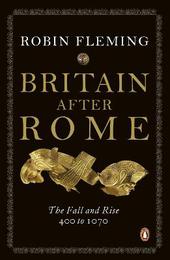
|
Britain After Rome: The Fall and Rise, 400 to 1070
Paperback / softback
Main Details
| Title |
Britain After Rome: The Fall and Rise, 400 to 1070
|
| Authors and Contributors |
By (author) Robin Fleming
|
| Series | Penguin History of Britain |
|---|
| Physical Properties |
| Format:Paperback / softback | | Pages:480 | | Dimensions(mm): Height 198,Width 129 |
|
| Category/Genre | British and Irish History |
|---|
| ISBN/Barcode |
9780140148237
|
| Classifications | Dewey:941 |
|---|
| Audience | |
|---|
|
Publishing Details |
| Publisher |
Penguin Books Ltd
|
| Imprint |
Penguin Books Ltd
|
| Publication Date |
5 May 2011 |
| Publication Country |
United Kingdom
|
Description
What was Britain like in the Dark Ages? Who walked across the landscape we now inhabit? Do objects such as those found in the Staffordshire hoard reveal a far more sophisticated, wealthy and militarized society than we had previously imagined? Britain After Rome stitches together a wealth of research and imaginative engagement to bring us as close as we can hope to get to the tumultuous centuries between the collapse of the Roman Empire in the West and the arrival of the Normans nearly seven centuries later. Robin Fleming depicts a country whose towns were abandoned, where Christianity had disappeared, and where immigrants and invaders came to settle. Yet it is also the world in which many of today's villages were founded, and Britain's vernacular languages and political arrangements were forged. Britain after Rome offers tantalizing glimpses of the surprising and resilient peoples who remade Britain in the centuries after Rome's collapse. It allows its readers to see Britain's history in a quite new light. 'An excellent, gripping and persuasive read . . . offers an entirely new insight into the past' British Archaeology' A sweeping work of impressive scope' Archaeology Review
Author Biography
Robin Fleming is the author of Kings and Lords in Conquest England and Domesday Book and the Law.She has taught for many years at Boston College and is currently Matina S. Horner Distinguished Visiting Professor at the Radcliffe Institute, Harvard University.
ReviewsThis is a very human and humane treatment of the forgotten people of early Britain... an exciting, often brilliant and always thought-provoking synthesis * Times Literary Supplement *
|